Collinss
I know how frustrating it can get with all those assignment deadlines and Impeding examinations! Nursing Being my main profession line, I have essential guides that are A graded and that have helped me a lot.
I am a super friendly person and you can message me for any assistance whatsoever.
We have to have each other's backs.
- 609
- 0
- 13
Community
- Followers
- Following
622 items
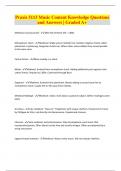
Praxis 5113 Music Content Knowledge Questions and Answers | Graded A+
Praxis 5113 Music Content Knowledge Questions and Answers | Graded A+ Medieval musical period - After fall of Rome 476 - 1300s Monophonic chant - Medieval. Single unison melodic line. Somber religious chants called plainchant or plainsong. Gregorian chants too. When other voices added, they moved parallel to the main voice. Cantus firmus - Main melody in a chant Motet - Medieval. Evolved from monophonic chant. Adding additional parts against main cantus firmus. Popular by 1200s. Cont...
- Exam (elaborations)
- • 27 pages •
Praxis 5113 Music Content Knowledge Questions and Answers | Graded A+ Medieval musical period - After fall of Rome 476 - 1300s Monophonic chant - Medieval. Single unison melodic line. Somber religious chants called plainchant or plainsong. Gregorian chants too. When other voices added, they moved parallel to the main voice. Cantus firmus - Main melody in a chant Motet - Medieval. Evolved from monophonic chant. Adding additional parts against main cantus firmus. Popular by 1200s. Cont...
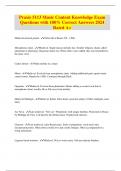
Praxis 5113 Music Content Knowledge Exam Questions with 100% Correct Answers 2024 Rated A+
Praxis 5113 Music Content Knowledge Exam Questions with 100% Correct Answers 2024 Rated A+ Medieval musical period - After fall of Rome 476 - 1300s Monophonic chant - Medieval. Single unison melodic line. Somber religious chants called plainchant or plainsong. Gregorian chants too. When other voices added, they moved parallel to the main voice. Cantus firmus - Main melody in a chant Motet - Medieval. Evolved from monophonic chant. Adding additional parts against main cantus firmus. ...
- Exam (elaborations)
- • 26 pages •
Praxis 5113 Music Content Knowledge Exam Questions with 100% Correct Answers 2024 Rated A+ Medieval musical period - After fall of Rome 476 - 1300s Monophonic chant - Medieval. Single unison melodic line. Somber religious chants called plainchant or plainsong. Gregorian chants too. When other voices added, they moved parallel to the main voice. Cantus firmus - Main melody in a chant Motet - Medieval. Evolved from monophonic chant. Adding additional parts against main cantus firmus. ...
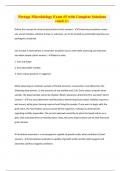
Portage Microbiology Exam #5 with Complete Solutions rated A+
Portage Microbiology Exam #5 with Complete Solutions rated A+ Define the concept of universal precautions (short answer) - Universal precautions means any and all samples, whether known or unknown, are to be treated as potentially hazardous (or pathogenic) materials List at lease 3 observations a researcher would be sure to note while assessing and unknown microbial sample (short answer) - Need to note: 1. Size and shape 2. Any observable motility 3. Gram status (positive or negativ...
- Exam (elaborations)
- • 9 pages •
Portage Microbiology Exam #5 with Complete Solutions rated A+ Define the concept of universal precautions (short answer) - Universal precautions means any and all samples, whether known or unknown, are to be treated as potentially hazardous (or pathogenic) materials List at lease 3 observations a researcher would be sure to note while assessing and unknown microbial sample (short answer) - Need to note: 1. Size and shape 2. Any observable motility 3. Gram status (positive or negativ...
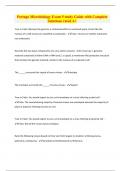
Portage Microbiology Exam 5 study Guide with Complete Solutions rated A+
Portage Microbiology Exam 5 study Guide with Complete Solutions rated A+ True or False: Because the genome is contained within an enclosed space, (much like the nucleus of a cell) viruses are classified as eukaryotic - False. Viruses are neither eukaryotic nor prokaryotic Describe the two basic components of a virus (short answer) - A virus has 1. genomic material comprised of either DNA or RNA and 2. a capsid, a membrane-like protective structure that contains the genetic material, ...
- Exam (elaborations)
- • 8 pages •
Portage Microbiology Exam 5 study Guide with Complete Solutions rated A+ True or False: Because the genome is contained within an enclosed space, (much like the nucleus of a cell) viruses are classified as eukaryotic - False. Viruses are neither eukaryotic nor prokaryotic Describe the two basic components of a virus (short answer) - A virus has 1. genomic material comprised of either DNA or RNA and 2. a capsid, a membrane-like protective structure that contains the genetic material, ...

Portage Microbiology Exam 4 with Complete Solutions rated A+
Portage Microbiology Exam 4 with Complete Solutions rated A+ True or False: Growth media is best suited for distinguishing between two similar species of bacteria - False. Growth media is designed to simply support (and not restrict) microbial growth A researcher is asked to determine which of two vials contains e coli and which contains salmonella. Knowing both gram-negative while only one of them is capable of fermenting lactose, which type of media would be best suited (multiple c...
- Exam (elaborations)
- • 6 pages •
Portage Microbiology Exam 4 with Complete Solutions rated A+ True or False: Growth media is best suited for distinguishing between two similar species of bacteria - False. Growth media is designed to simply support (and not restrict) microbial growth A researcher is asked to determine which of two vials contains e coli and which contains salmonella. Knowing both gram-negative while only one of them is capable of fermenting lactose, which type of media would be best suited (multiple c...
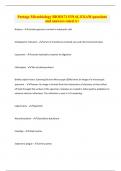
Portage Microbiology BIOD171 FINAL EXAM questions and answers rated A+
Portage Microbiology BIOD171 FINAL EXAM questions and answers rated A+ Nucleus - contains genomic content in eukaryotic cells Endoplasmic reticulum - series of membrane enclosed sacs and interconnected tubes Lysosomes - contain hydrolytic enzymes for digestion Chloroplast - Site of photosynthesis Briefly explain how a Scanning Electron Microscope (SEM) forms an image of a microscopic specimen. - Answer: An image is formed from the interactions of electrons as they reflect off (not thr...
- Exam (elaborations)
- • 8 pages •
Portage Microbiology BIOD171 FINAL EXAM questions and answers rated A+ Nucleus - contains genomic content in eukaryotic cells Endoplasmic reticulum - series of membrane enclosed sacs and interconnected tubes Lysosomes - contain hydrolytic enzymes for digestion Chloroplast - Site of photosynthesis Briefly explain how a Scanning Electron Microscope (SEM) forms an image of a microscopic specimen. - Answer: An image is formed from the interactions of electrons as they reflect off (not thr...

Portage Learning BIOD 171 Module 6 Study guide with Complete Solutions rated A+
Portage Learning BIOD 171 Module 6 Study guide with Complete Solutions rated A+ True or False: viruses can be classified as prokaryotic or eukaryotic - False. Viruses are neither prokaryotic or eukaryotic What is an obligate intracellular parasite? - viruses cannot replicate unless inside a living host cell. As a parasite, a virus depends on its living host to provide the framework (proteins, etc) to replicate—to make additional copies of itself. What is a viral capsid? - a membrane-...
- Exam (elaborations)
- • 12 pages •
Portage Learning BIOD 171 Module 6 Study guide with Complete Solutions rated A+ True or False: viruses can be classified as prokaryotic or eukaryotic - False. Viruses are neither prokaryotic or eukaryotic What is an obligate intracellular parasite? - viruses cannot replicate unless inside a living host cell. As a parasite, a virus depends on its living host to provide the framework (proteins, etc) to replicate—to make additional copies of itself. What is a viral capsid? - a membrane-...
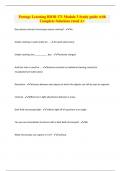
Portage Learning BIOD 171 Module 3 Study guide with Complete Solutions rated A+
Portage Learning BIOD 171 Module 3 Study guide with Complete Solutions rated A+ Does phase contrast microscopy require staining? - No Simple staining is used mostly for... - A quick observance Simple staining uses __________ dye. - Positively charged Acid fast stain is used for... - bacteria resistant to traditional staining; mostly for mycobacterium tuberculosis Resolution - distance between two objects at which the objects can still be seen as separate Contrast - difference in light a...
- Exam (elaborations)
- • 4 pages •
Portage Learning BIOD 171 Module 3 Study guide with Complete Solutions rated A+ Does phase contrast microscopy require staining? - No Simple staining is used mostly for... - A quick observance Simple staining uses __________ dye. - Positively charged Acid fast stain is used for... - bacteria resistant to traditional staining; mostly for mycobacterium tuberculosis Resolution - distance between two objects at which the objects can still be seen as separate Contrast - difference in light a...
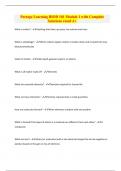
Portage Learning BIOD 101 Module 1 with Complete Solutions rated A+
Portage Learning BIOD 101 Module 1 with Complete Solutions rated A+ What is matter? - Anything that takes up space, has volume and mass What is autophagy? - When cellular organic matter is broken down and recycled into new biomacromolecules States of matter - Solid, liquid, gaseous (vapor), or plasma What is all matter made of? - Elements What are essential elements? - Elements required for human life What are trace elements? - Elements required only in small quantities How are molecu...
- Exam (elaborations)
- • 14 pages •
Portage Learning BIOD 101 Module 1 with Complete Solutions rated A+ What is matter? - Anything that takes up space, has volume and mass What is autophagy? - When cellular organic matter is broken down and recycled into new biomacromolecules States of matter - Solid, liquid, gaseous (vapor), or plasma What is all matter made of? - Elements What are essential elements? - Elements required for human life What are trace elements? - Elements required only in small quantities How are molecu...

Portage BIOD 171 Module 2 with Complete Solutions rated A+
Portage BIOD 171 Module 2 with Complete Solutions rated A+ What is cellular metabolism? - a controlled set of biochemical reactions that occur in living organisms in order to maintain life. What is the primary function of enzymes and how are they regulated? - Enzymes speed up chemical reactions. Most notably, the enzyme is not consumed during the reaction and can be used repeatedly by the cell. Enzymes can also be regulated by a cofactor such that in the absence of the proper cofacto...
- Exam (elaborations)
- • 4 pages •
Portage BIOD 171 Module 2 with Complete Solutions rated A+ What is cellular metabolism? - a controlled set of biochemical reactions that occur in living organisms in order to maintain life. What is the primary function of enzymes and how are they regulated? - Enzymes speed up chemical reactions. Most notably, the enzyme is not consumed during the reaction and can be used repeatedly by the cell. Enzymes can also be regulated by a cofactor such that in the absence of the proper cofacto...
